
Horace St. John Kelly Donisthorpe was an eccentric British myrmecologist and coleopterist, memorable in part for his enthusiastic championing of the renaming of the genus Lasius after him as Donisthorpea, and for his many claims of discovering new species of beetles and ants.
Polyrhachis sokolova is a species of ant from Australia and New Guinea that recently was discovered to be capable of surviving tidal inundations.
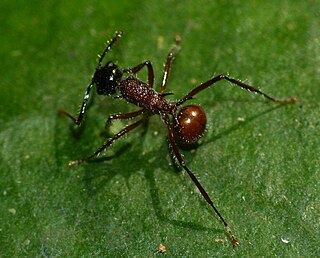
Polyrhachis is a genus of formicine ants found in the Old World with over 600 species. The genus is yet to be comprehensively resolved and contains many varied species including nest-weavers, swimming workers, soil and tree-dwellers. The first fossil record of this genus was of Polyrhachis annosa from the Miocene.

Polyrhachis gracilior is a species of ant found in the southwest and northeast India. It is one of the few ants that build arboreal nests made of leaves stitched together using silk produced by their larvae.
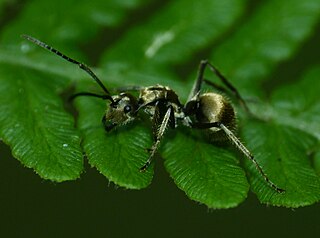
Polyrhachis illaudata is a species of large ant found in Sri Lanka, India extending through Southeast Asia to the Philippines. The colonies have a single queen and nest within wood.

Polyrhachis bugnioni is a species of ant in the subfamily Formicinae, found in Sri Lanka.
Polyrhachis exercita is a species of ant in the subfamily Formicinae, found in India, Sri Lanka, and Bangladesh.

Polyrhachis hippomanes is a species of ant in the subfamily Formicinae, found in Sri Lanka. Three subspecies are recognized. 2 subspecies were given full species status recently.
Polyrhachis horni is a species of ant in the subfamily Formicinae. It is found in India and Sri Lanka.
Polyrhachis nigra is a species of ant in the subfamily Formicinae. It is endemic to Sri Lanka.
Polyrhachis punctillata is a species of ant in the subfamily Formicinae, found in few Asian countries. Three subspecies are recognized.
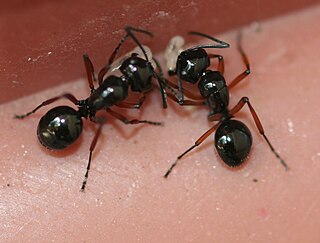
Polyrhachis rastellata is a species of ant in the subfamily Formicinae, found in few Asian countries. Two subspecies are recognized. Some texts include many more subspecies ranks. but it is debatable about these ranks. The following ten subspecies are according to Integrated Taxonomic Information System
Polyrhachis rupicapra is a species of spiny ant belonging to the genus Polyrhachis in the subfamily Formicinae, found in Sri Lanka, India, and China.
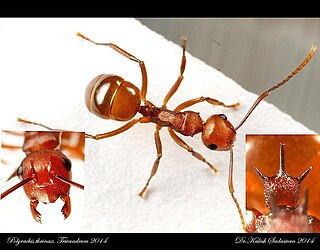
Polyrhachis thrinax is a species of ant in the subfamily Formicinae, found in many Asian countries. There are 6 or 7 subspecies recognized.
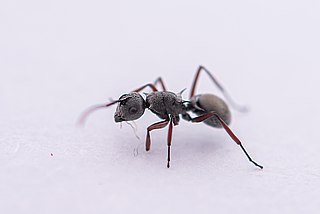
Polyrhachis tibialis is a species of ant in the subfamily Formicinae, found in many Asian countries. There are 10 subspecies recognized.
Polyrhachis xanthippe is a species of ant in the subfamily Formicinae. It is endemic to Sri Lanka.
Polyrhachis yerburyi is a species of ant in the subfamily Formicinae. It is endemic to Sri Lanka.







